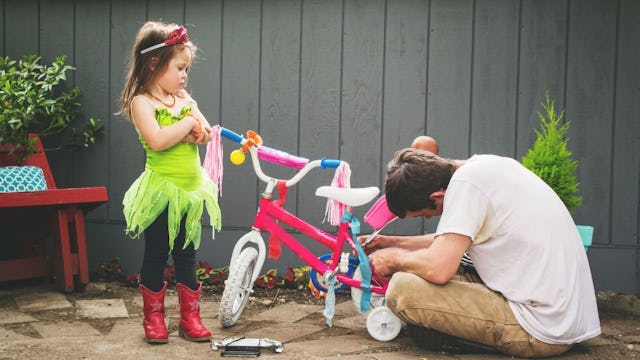Why It's Important To Let Your Kids See You Struggle

Grit is a pretty big topic in education right now. For those of you unfamiliar with this idea, it revolves around effort and persistence rather than IQ and natural ability. However, most of the grit dialog centers on elementary and high school age children.
But what about babies and toddlers?
I know. I’m with you. When I thought about teaching a baby, or even a toddler, about persistence I rolled my eyes. Hard. If anyone knows about persistence it’s toddlers. All three of the toddlers I’ve had in my home were persistently following me into the restroom regardless of what I did to stop them.
But bear with me. This is pretty interesting.
Julia Leonard, Ph.D. Student in Brain and Cognitive Sciences at Massachusetts Institute of Technology, recently performed a study where she “showed 15-month-old babies one of two things: an experimenter working hard to achieve two different goals (getting a toy out of a container and getting a keychain off a carabiner), or an experimenter who effortlessly reached each goal.”
Turns out the children who watched someone struggle with the task before doing it themselves were twice as likely to continue trying to accomplish the task before giving up.
Twice as likely is pretty significant, folks. That’s like double your money.
As parents, what does this tell us? Well, for me as a father, it tells me a few things. One is that my children are always watching. This, however, I already knew. I have three children (10, 8, and 3) and they always seem to be peeking around some corner, watching me do everything from looking on my phone (they love to nose in on that activity) to fixing crap around the house.
I assumed they were learning from my example. I think all parents assume that. But I don’t think I fully appreciated how much they were learning from watching me until I read this story. And in some ways, I think this takes some of the pressure off.
According to this study, it’s okay for my children to see me struggle. They actually learn a lot about persistence. For example, a few months ago I was trying to fix our bathroom sink. It wasn’t going well. It took me several hours. I watched about a dozen YouTube videos of other people doing it, step by step, as though it was the easiest thing ever. There were so many swear words flying out of my mouth that my wife actually took our children to the park.
Although my children knew what I was working on, they didn’t actually help me. But they knew what I was working on, and they knew it was a struggle. (With all the shouting and muttered expletives, there’s no way they couldn’t have known.) The whole day, I felt like a total failure. But ultimately, by that evening, the sink was working.
My children watched me come at a task, struggle with it, and keep working until I accomplished it. Yes, I got mad. Sure, I invented a few swears. But they saw me work through all that, and fix the problem. I assumed that I’d done something wrong by struggling so hard, and that my children saw me as an incompetent, Tim Taylor-type who can’t fix anything. But perhaps they actually saw their father face a task head on and struggle through it.
Honestly, that’s what I want from them. I want them to be persistent. I want them to have grit. I think all of us want that. And according to this study, even at 15 months, our children are absorbing how we work, when we give up, and figuring out how to keep trying.
So much of what we do as parents comes down to setting a good example. And I know, those of you reading this are feeling even more pressure. I hear this statement all the time, and I am often left second guessing myself, wondering if I actually am all that great of an example.
But on the flip side, Julia Leonard hands out some comfort, saying “this study suggests that parents don’t have to make things look easy all the time. The next time you struggle to open that tomato container, it’s OK, maybe even beneficial, to let your child see you sweat.”
So the next time you are cursing and struggling to fix your kids’ bike or complete some meager task, the next time you are red-faced and embarrassed because it shouldn’t be that hard, and you turn around to find your child silently watching from the sidelines (we’ve all been there), don’t feel too bad. They might not be silently judging you. They might actually be learning from your persistence.
This article was originally published on